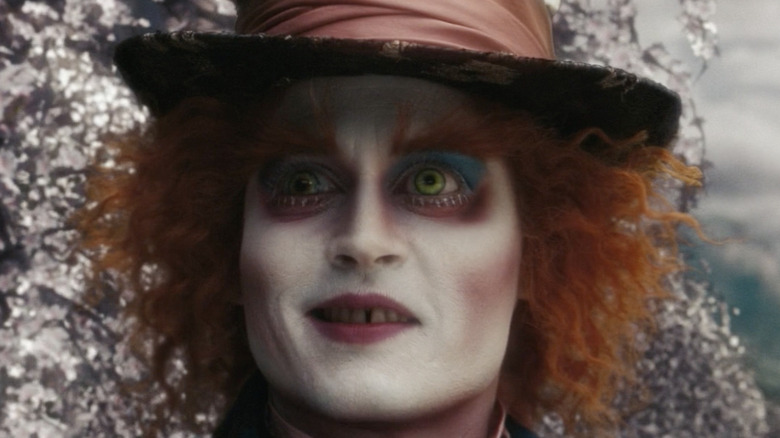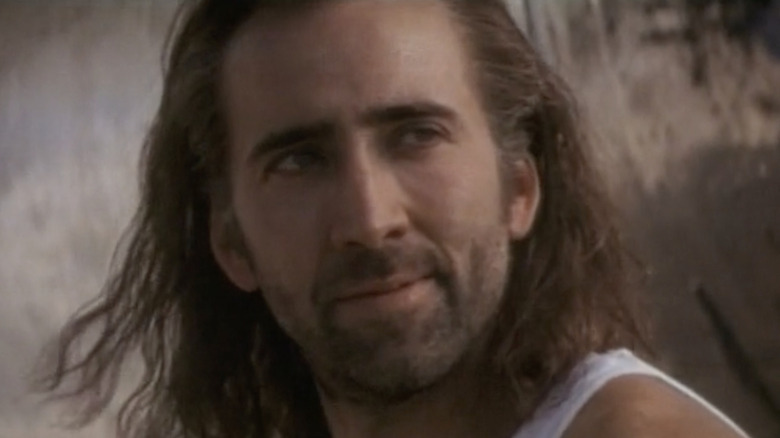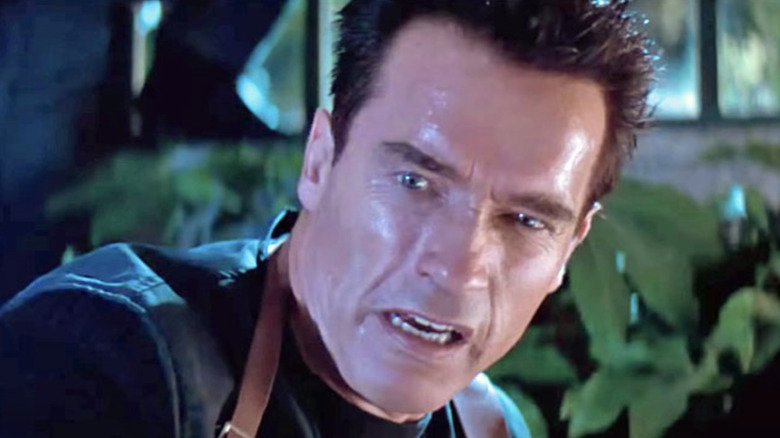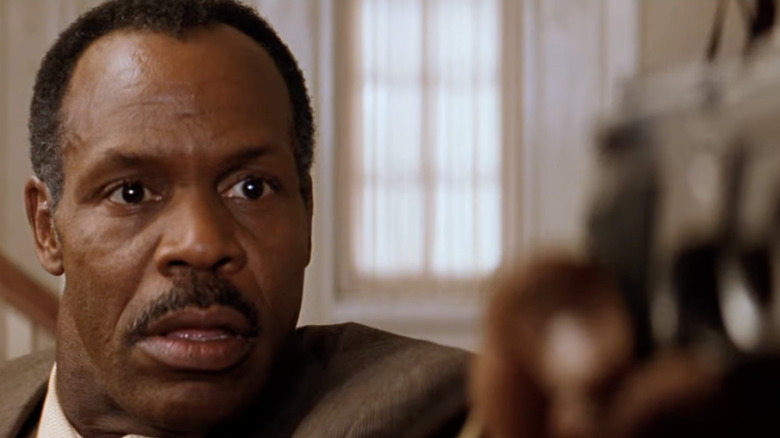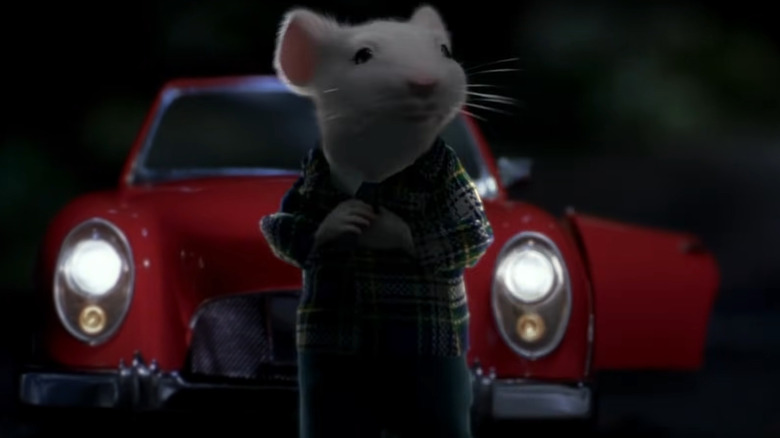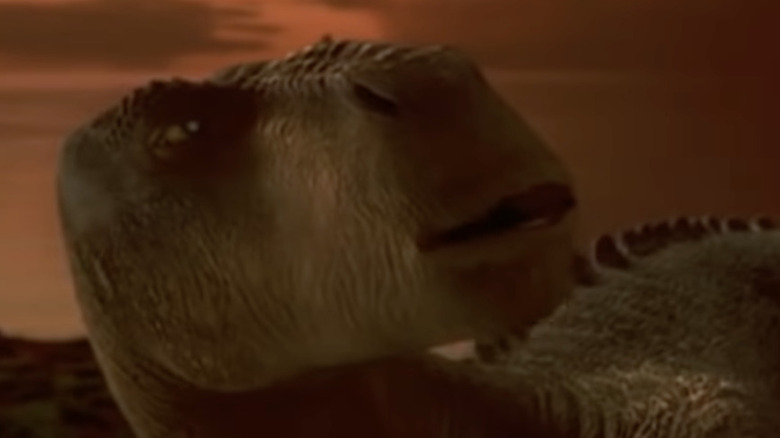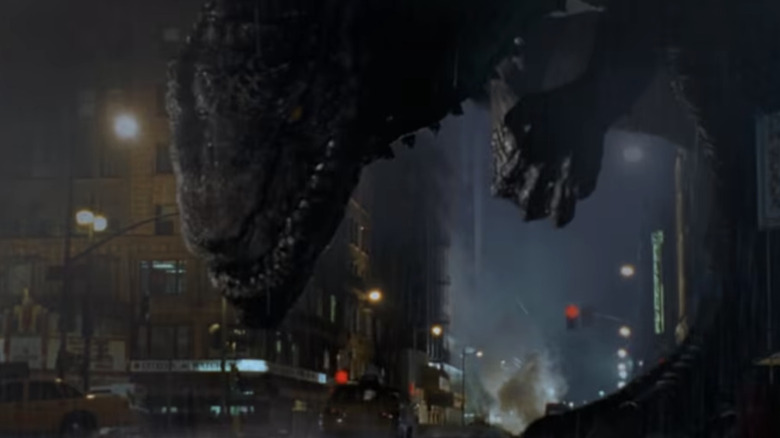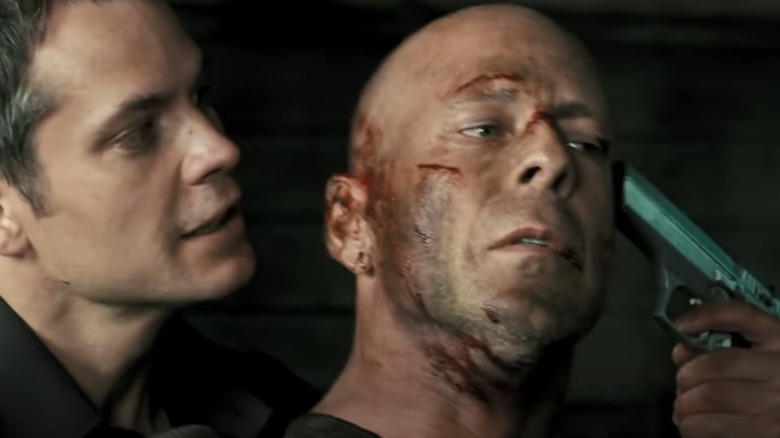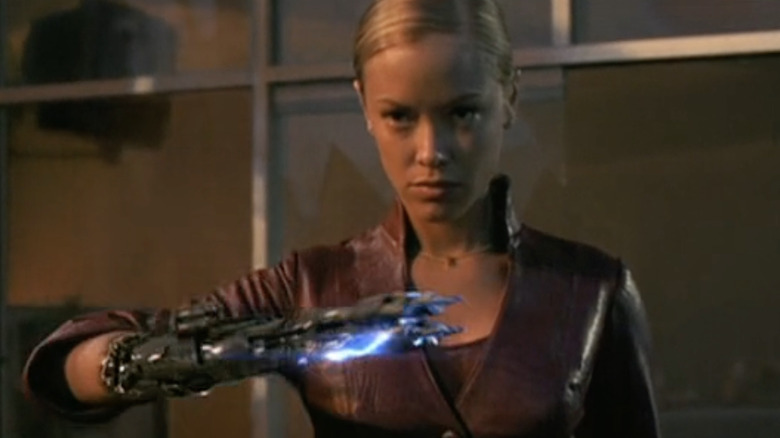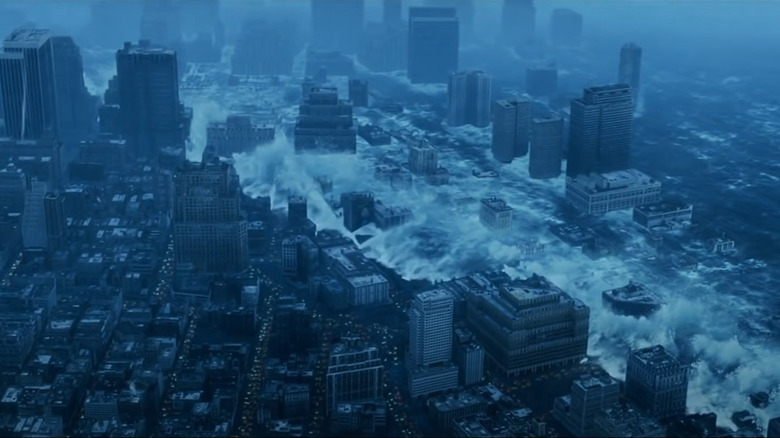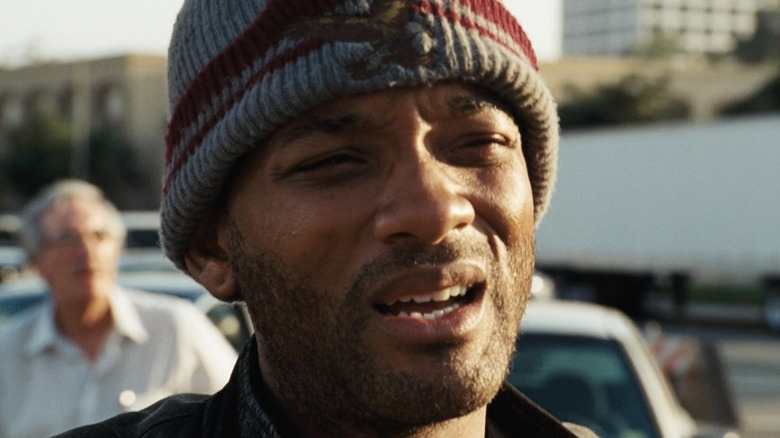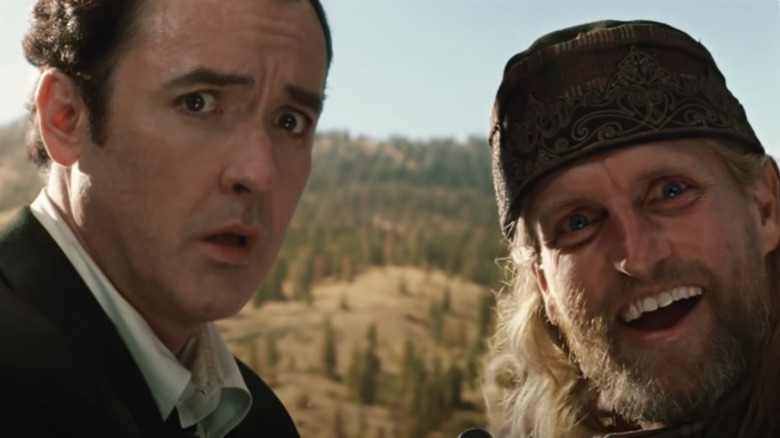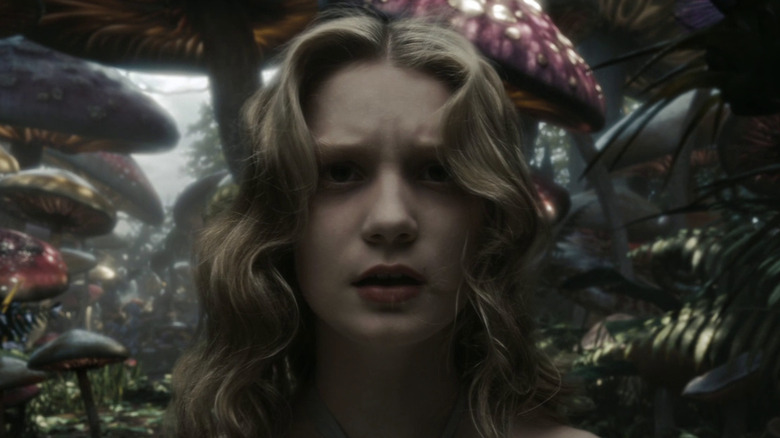Blockbuster Movies That Are Now Almost Entirely Forgotten
The 1970s saw the birth of the "blockbuster" (as we currently know the term) with the release of unexpected smash hits like "The Godfather" (1972), "Jaws" (1975) and "Star Wars" (1977), which promised an amazing, thrilling, and unique movie-watching experience (via IndieWire). Some of these blockbusters have gone on to become pop culture phenomena, which have spawned sequels, prequels, spinoffs, and spoofs. But it's not just a franchise's long-lasting nature that is proof of a particular blockbuster's importance in the zeitgeist. Well-written blockbusters have given us countless memorable phrases and lines that we frequently quote in everyday life. "I'll be back," "May the force be with you," "I'm gonna make him an offer he can't refuse," and many others have become permanent parts of our lexicon.
However, just because a film made a ton of money when it first came out doesn't mean that it will be quoted, referenced, or even remembered. Heck, James Cameron's "Avatar" is the highest-grossing movie ever made. While it does have groundbreaking visual effects, the only reason people are still talking about it is because of Cameron's occasional announcement on the long-awaited sequel's updates. But can anyone today actually quote any line from "Avatar?"
Who knows why some blockbusters are guaranteed a spot in posterity, while others languish in the annals of random streaming platform recommendations. Tastes change and trends shift, which may explain why a film can be incredibly popular for a brief time but then disregarded soon after. So, we've decided to shine a spotlight on some blockbusters that did big business upon their release, but have since become almost entirely forgotten by audiences.
Con Air (1997)
For being such a forgettable blockbuster, "Con Air" actually has an impressive cast: Nicolas Cage, John Cusack, John Malkovich, Ving Rhames, Dave Chappelle, Steve Buscemi, Danny Trejo, as well as plenty of other faces you may recognize from other films and TV shows.
"Con Air" tells the story of Cameron Poe (Cage), a highly decorated Army Ranger sergeant, who's just been honorably discharged and returns to his family to live the quiet life with them. However, he accidentally kills someone for drunkenly attacking his wife, and is then sentenced to prison for ten years. Fast-forward eight years: Poe is about to be released with parole and is looking forward to finally realizing his dream of being with his wife and child.
All he has to do is share a prison airplane filled with some of the most sadistic and dangerous men ever captured, and then he's home free. Nothing can go wrong, right? As expected, Poe's plans are ruined when the other prisoners take over the plane and kill the prison staff, all as part of their plan to escape their prison sentences and leave the country. What follows is plenty of audience-pleasing explosions, shootouts, and over-the-top death scenes.
But apparently, audiences weren't pleased enough to keep the film in their memories. It's certainly a cheesy-yet-fun '90s action flick, and the solid cast is obviously having a blast with the material. Yet there aren't too many people who would consider "Con Air" a classic today.
Eraser (1996)
Throughout the 1980s and 1990s, it seemed that almost every film that Arnold Schwarzenegger starred in was a major hit. Even if the film itself was fairly mediocre, he seemed to have the ability to pull box office business out of a magician's hat.
One of those mediocre Schwarzenegger blockbusters was the 1996 film "Eraser," which also features Vanessa Williams and James Caan. Schwarzenegger plays U.S. Marshal John "Eraser" Kruger, whose nickname comes from his ability to "erase" the witness he's assigned to protect. He helps them fake their deaths to hide them and prevent them from being killed by anyone who wants to stop them from testifying. Kruger has been assigned to safeguard defense contractor Lee Cullen (Williams), who tipped off the FBI that her company is working on a high-tech weapon that they plan to sell on the black market.
Because this is a '90s Schwarzenegger action flick and not a romantic comedy, there are explosions, international terrorists, and eye-rollingly bad one-liners galore. While there's enjoyment to be had here for the casual shoot-'em-up fan, don't expect a high art film. "Eraser" didn't fare well with critics, nor does it seem to be remembered as one of Schwarzenegger's better films from the era. However, someone has apparently kept "Eraser" kicking around in the back of their mind, as its remake, "Eraser: Reborn," is set for a 2022 release.
Lethal Weapon 4 (1998)
The "Lethal Weapon" franchise has always been fairly popular. The first film in the series was released in 1987 and was well-received by critics and audiences alike. And while the film's sequels tended to gradually get worse and worse with each subsequent installment, they still brought in considerable business (via The Numbers).
Odd couple police detectives Martin Riggs (Mel Gibson) and Roger Murtaugh (Danny Glover) return in the 1998 sequel "Lethal Weapon 4" to take down Chinese crime boss Wah Sing Ku (Jet-Li), who's running an immigrant smuggling ring and is producing counterfeit currency. As usual, Riggs and Murthaugh are too old for this ... stuff, but that doesn't stop them from shooting first and asking questions later. And since Ku and his lackeys are now targeting the detectives' loved ones, it's gotten personal.
"Lethal Weapon 4" has a lot going for it, including an amazing cast (Mel Gibson, Danny Glover, Joe Pesci, Rene Russo, Chris Rock, and Jet Li), but it still hasn't stood the test of time. While critics applauded the cast and the action scenes, they were less thrilled with the story, which many felt was routine and didn't live up to that of previous films in the franchise. However, considering Mel Gibson has claimed that he's going to direct and star in "Lethal Weapon 5" (and Danny Glover will return too), maybe the series can get a proper send-off.
Stuart Little (1999)
Big action movies aren't the only ones capable of making a splash when they first came out, only to be largely abandoned by the public years later. Family-friendly films are also more than up for that task.
Take "Stuart Little," the big-budget live action adaptation of the classic children's novel E. B. White. The film had some big names attached: Geena Davis and Hugh Laurie starred, while Michael J. Fox voiced the titular character. And M. Night Shyamalan even co-wrote the script.
"Stuart Little" tells the story of the Little couple (Laurie and Davis), who want to adopt a younger brother for their son George (Jonathan Lipnicki). However, George is none too happy when his parents return with his new baby brother: an anthropomorphic mouse named Stuart. But the Little family member that's even more upset about the new addition is their cat, Snowbell, who will do anything to get rid of Stuart. Stuart has his work cut out for him, but because he has a massive heart (despite his diminutive size), he'll stop at nothing to win over his new family with his love and whimsical nature.
The film received mixed reviews, but it did receive some Oscar attention with a nomination for "Best Visual Effects." While the film was a box office hit (no doubt due to the popularity of the source material as well as the A-list cast), "Stuart Little" hasn't had much cultural staying power. It was followed by two sequels (one of which was direct-to-video) and a brief TV series, but those are even more forgotten than the original.
Dinosaur (2000)
Because kids have always loved dinosaurs, it only made sense for Disney to give the subject the big-budget treatment. By combining the CGI wizardry of "Jurassic Park" with the family-friendly storytelling of "The Land Before Time," the creatively titled "Dinosaur" was born.
The protagonist of the film is Aladar (voiced by D.B. Sweeney), the only survivor of an Iguanodon nest that was destroyed by a Carnotaurus. Aladar is raised by a family of lemurs, and together they flee their home when it's devastated by a meteor. Their plan is to travel to safer grounds, but they must survive all kinds of prehistoric dangers that await them on their quest.
Interestingly, this film's origins date back to 1986, when stop-motion effects legend Phil Tippett was working on Paul Verhoeven's classic, "Robocop." According to Tippett in an interview with Syfy Wire, the two were planning to make a more realistic dinosaur movie that would use a range of special effects techniques to more graphically display what life may have been like in the Cretaceous Period. For their film, Verhoeven wanted "meteors and the death of the dinosaurs and huge battles with geysers of blood." The two brought the film to Disney and long story short, the years of back-and-forth between the filmmakers and Disney ultimately rendered their vision extinct, only to be resurrected in the more kid-accessible version that audiences finally saw.
It's a shame, because maybe the Tippett and Verhoeven version of "Dinosaur" would have resulted in a film with more staying power than the technically great yet ultimately bland product we got in 2000.
Godzilla (1998)
The first of several Roland Emmerich films to appear on this list, "Godzilla" was released after Emmerich's previous (and much more memorable) 1996 blockbuster, "Independence Day."
In this Americanized version of the beloved Japanese giant monster film icon, Matthew Broderick stars as the scientist Dr. Niko Tatopoulos, who specializes in the consequences of nuclear radiation on biology and the environment. He's asked to help to track down a large creature that's been causing considerable damage in numerous countries around the world. And because it's basically a law that New York City needs to be destroyed in almost every disaster movie, the creature — Godzilla — makes its way to the Big Apple and begins tearing the place up, wreaking almost as much havoc as the inept military that's sent to destroy it. The problem is compounded even further when it's discovered that Godzilla has laid more than 200 eggs in Madison Square Garden.
While "Godzilla" was a major financial hit, it was a huge failure with critics, who lambasted the film's lack of interesting characters or compelling plot. The film also had the bad luck of being released a year after Steven Spielberg's "The Lost World: Jurassic Park," which, while not exactly a hit with critics either, had many siilar sequences that featured in "Godzilla" as well. For example, the baby Godzillas sequence feels awfully close to something seen in a "Jurassic Park" flick, and "The Lost World" also had a Tyrannosaurus Rex rampaging through a major metropolitan area (and a Godzilla joke thrown in, to boot).
Live Free or Die Hard (2007)
The long-awaited sequel to the original "Die Hard" trilogy was finally released in 2007 (over 10 years after 1995's "Die Hard with a Vengeance"), and considering how little the film is remembered today, it's safe to say it wasn't really worth the wait.
Bruce Willis returns as the ever-grouchy NYPD detective John McClane, who's called in to take down a cyber-terrorist organization that's hacking into federal computer systems to disrupt the nation's infrastructure. The excellent cast includes Timothy Olyphant as the villain and leader of the cyber-terrorist group, Justin Long as a young hacker tangled up with some real bad guys, Mary Elizabeth Winstead as McClane's daughter, and Kevin Smith as another hacker, who helps McClane save the day.
"Live Free or Die Hard" received solid reviews and was a box office hit; in fact, it's the most financially successful of the series. So, why hasn't it had much of an impact on pop culture? For one, it's the only film in the franchise to be theatrically released with a PG-13 rating, which meant that the violence and profanity were softened, and this ultimately resulted in a less intense cinematic experience. Or maybe it's simply the fact that, while the film features plenty of beloved aspects from the previous ones, it lacked that big and cheesy style so emblematic of classic action movies from the heyday of the late-'80s to the mid-'90s.
Terminator 3: Rise of the Machines (2003)
James Cameron gave the world a terrific sci-fi action film in 1984's "The Terminator," and somehow managed to top it with 1991's "Terminator 2: Judgement Day," which was financially more successful than its predecessor. Both films were hits with critics and audiences and became instant classics. So, the folks behind "Terminator 3: Rise of the Machines" had a lot to live up to, particularly since this third film didn't include James Cameron's involvement (which might explain a lot).
In this installment, it's well past the time when Skynet was supposed to go to war with the human race, and John Connor (Nick Stahl) is now an aimless vagrant living off the grid. However, the Skynet of the future sends another robot to kill him and prevent him from leading the resistance against them, which is now fated to take place at a later point in time. This robot, the T-X (Kristanna Loken), has the similar shapeshifting abilities of the T-1000, but is also equipped with advanced, futuristic weaponry. Thankfully, another reprogrammed T-800 (Arnold Schwarzenegger) is also sent back in time to protect John, and so, the battle of the Terminators begins.
While it's great seeing Schwarzenegger return as the classic T-800, the film doesn't quite match the cinematic power of its predecessors. "Terminator 2" managed to be even better than the original, and was filled with even more memorable lines, iconic scenes, and innovative special effects. "Terminator 3: Rise of the Machines," on the other hand, doesn't add much to the mythos of the series, which is probably why it's been ignored, along with every other installment post-"Terminator 2: Judgment Day."
The Day After Tomorrow (2004)
Roland Emmerich returns with another lucrative movie that we've all pretty much erased from our collective memory. With this disaster film, Emmerich turns to the subject of climate change and the dire effects it has on the planet. Paleoclimatologist Jack Hall (Dennis Quaid) learns that a massive climate shift is about to occur and that Earth is in for some really bad weather. In true disaster flick fashion, the government doesn't believe the person trying to save the world until it's too late. As unusual weather conditions start hitting all over the place, Jack must race to New York to save his son (Jake Gyllenhaal) before the next ice age begins ... tomorrow.
Because Roland Emmerich is the director, "The Day After Tomorrow" is packed with countless famous landmarks getting destroyed with as much over-the-top excess as possible. The movie was sold on these scenes, which were enough to put people in seats, but not enough for moviegoers to give it much thought after watching it. Audiences may have been thrilled (and horrified) by the massive scenes of global devastation, but since "The Day After Tomorrow" didn't have much going for it in terms of plot, character, and actual science, it remains another faceless popcorn flick.
Hancock (2008)
2008 was a great year for superhero movies: "The Dark Knight" was released and the Marvel Cinematic Universe was launched with "Iron Man." With capes dominating cinemas that year, it was to be expected that a movie making fun of just how destructive superheroes could be would come along. Enter "Hancock."
Will Smith plays the titular character, an alcoholic with superpowers who, even though he usually saves the day, tends to cause massive damage in the process. The public has grown pretty sick of his destructive antics, so a public relations specialist named Ray Embrey (Jason Bateman) offers to help rehabilitate Hancock's image.
It's no wonder that the film attracted such a large audience when it was first released. Will Smith has always been popular with moviegoers, and it came out when a massive superhero movie boom was underway. While some critics were impressed with the setup of "Hancock," the film got mostly negative reviews, as many felt it got too silly and unbelievable in the second half. Regardless, the film has a fun premise, and it does a nice job of subverting superhero clichés. However, it seems that its brief flirtations with cleverness weren't enough to keep its reputation alive into posterity.
2012 (2009)
Remember when so many of us believed that the world was going to end in 2012? Well, whether or not Roland Emmerich actually thought that, he surely didn't want to let a good panic go to waste. So, he decided to marry his love of disaster movies and current events to make "2012." Seems like he wanted to get in one more blockbuster before life as we know it came to an end, and who can blame him?
Emmerich pulled out all of the stops for this film about some strange phenomenon happening in Earth's core that's causing massive global devastation, and boy are the destruction scenes impressive. Cities are wiped out by behemoth tidal waves, whole chunks of populated areas are shifted and rocked about by monstrous earthquakes, eruptions and ash clouds destroy everything in sight, and so much more. Oh, and John Cusack, Amanda Peet, Chiwetel Ejiofor, Oliver Platt, Thandie Newton, Danny Glover, and Woody Harrelson play characters, who are caught up in all of the CGI mayhem.
"2012," like most of Emmerich's other disaster films, was praised by critics for its visuals, but panned for its predictable script and boring characters. The apocalyptic sequences in the film still hold up fairly well today, but by that point audiences had gotten used to Emmerich's formula, from which he rarely strays. Watching the world blow up on the big screen can be fun (which may explain why the film attracted such big business when it came out), but so rarely does a film like that do something interesting enough to remain in our collective memories once we leave the theater.
Alice in Wonderland (2010)
Worldwide gross: $1,025,468,216
Who could resist seeing Tim Burton take on such a classic Disney animated film like 1951's "Alice in Wonderland?" And with a strong cast that included Johnny Depp, Anne Hathaway, Helena Bonham Carter, Crispin Glover, Matt Lucas, and Mia Wasikowska, there was great incentive to watch Burton's 2010 live-action update of Lewis Carroll's classic novel.
Set in 1871 London, the film follows a young woman named Alice (Wasikowska), who's being pressured into marrying a nobleman she has no affection for. While at a party, Alice spots a white rabbit and chases after it, only to fall into a mysterious hole in the garden that transports her to a magical world populated by all kinds of kaleidoscopic creatures, like Absolem the Caterpillar, the Talking Flowers, the Bandersnatch, the Cheshire Cat, and more. The adventures Alice embarks on in this whimsical land culminate in a giant chess game held between the tyrannical Red Queen (Helena Bonham Carter) and the gentle White Queen (Anne Hathaway).
"Alice in Wonderland" was widely praised for its visuals, and even got some Oscar love: The film won Academy Awards for "Costume Design" and "Art Direction," and was nominated for "Visual Effects." However, critics and audiences were less thrilled with the film's lack of emotional resonance. The film was popular enough to warrant a 2016 sequel, "Alice Through the Looking Glass," but that film grossed far less than its predecessor. While "Alice in Wonderland" has plenty of Tim Burton's signature imagination, it didn't have the quirky charm of some of his other, more beloved films, like "Beetlejuice" or "Edward Scissorhands," which is perhaps why it made less of an impression on our culture (in spite of its source material).
